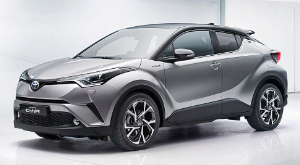|
|
| Line 1: |
Line 1: |
| | [[File:2016_Toyota_C-HR_Hybrid.jpg]] | | [[File:2016_Toyota_C-HR_Hybrid.jpg]] |
| | | | |
| − | '''Toyota C-HR (NGX10/ZYX10/NGX50/ZYX10). 2016–23 (prod. n/a). 5-door SUV. F/F, F/A, 1197, 1798, 1986 cm³ petrol, 1798 cm³–1·3 kWh, 1986 cm³–1·3 kWh petrol–electric hybrid (I4 DOHC), 54·3 kWh electric.''' Originally conceived for Europe, a compact crossover on Toyota’s New Global Architecture (TNGA-C) shared with the [[Toyota Prius (ZVW50)]] (albeit with a shorter wheelbase), and overseen by engineer Hiro Koba. C-HR stood for Coupé-High Rider. Unusually for Toyota, the company placed style over interior room first, and when the dynamics of the smaller prototype weren’t up to par, they waited for the newer platform, with a lower centre of gravity. Interesting interior with better quality materials, another surprise for Toyota. Decent steering, good ride. Some engine noise. | + | '''Toyota C-HR (NGX10/ZYX10/NGX50/ZYX10). 2016–23 (prod. n/a). 5-door SUV. F/F, F/A, 1197, 1798, 1986 cm³ petrol, 1798 cm³–1·3 kWh, 1986 cm³–1·3 kWh petrol–electric hybrid (I4 DOHC), 54·3 kWh electric.''' Originally conceived for Europe, a compact crossover on Toyota’s New Global Architecture (TNGA-C) shared with the [[Toyota Prius (ZVW50)]] (albeit with a shorter wheelbase), and overseen by engineer Hiro Koba. C-HR stood for Coupé-High Rider. Unusually for Toyota, the company placed style over interior room first, and when the dynamics of the smaller prototype weren’t up to par, they waited for the newer platform, with a lower centre of gravity. Interesting interior with better quality materials, another surprise for Toyota. Cramped rear accommodation thanks to the sloping roofline. Decent steering, good ride. Some engine noise. |
| | | | |
| | | | |
Revision as of 12:24, 5 October 2024

Toyota C-HR (NGX10/ZYX10/NGX50/ZYX10). 2016–23 (prod. n/a). 5-door SUV. F/F, F/A, 1197, 1798, 1986 cm³ petrol, 1798 cm³–1·3 kWh, 1986 cm³–1·3 kWh petrol–electric hybrid (I4 DOHC), 54·3 kWh electric. Originally conceived for Europe, a compact crossover on Toyota’s New Global Architecture (TNGA-C) shared with the Toyota Prius (ZVW50) (albeit with a shorter wheelbase), and overseen by engineer Hiro Koba. C-HR stood for Coupé-High Rider. Unusually for Toyota, the company placed style over interior room first, and when the dynamics of the smaller prototype weren’t up to par, they waited for the newer platform, with a lower centre of gravity. Interesting interior with better quality materials, another surprise for Toyota. Cramped rear accommodation thanks to the sloping roofline. Decent steering, good ride. Some engine noise.
Manufacturing locations: Ōhira, Miyagi, Japan; Guangzhou, China; Tianjin, China; Sakarya, Turkey; Chachoengsao, Thailand
Marque: Toyota | Model: Toyota C-HR | Predecessor: Daihatsu Be-Go | Successor: Toyota C-HR (ZYX20)



